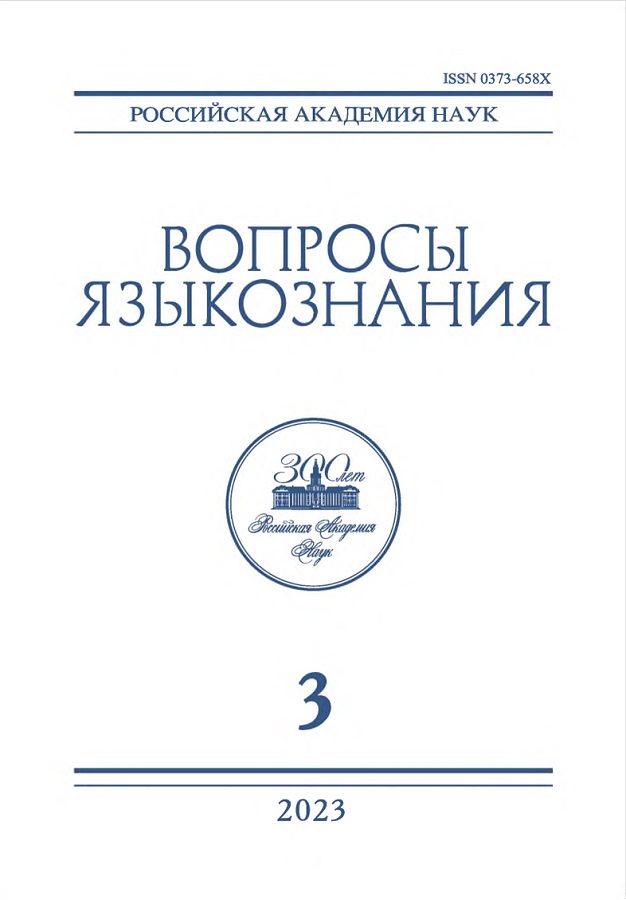Causative constructions in Bezhta
- Autores: Khalilova Z.M.1
-
Afiliações:
- Institute of Linguistics, Russian Academy of Sciences
- Edição: Nº 3 (2023)
- Páginas: 99-121
- Seção: Articles
- URL: https://permmedjournal.ru/0373-658X/article/view/650639
- DOI: https://doi.org/10.31857/0373-658X.2023.3.99-121
- ID: 650639
Citar
Texto integral
Resumo
The causative constructions of Bezhta, a Nakh-Daghestanian language, display a range of crosslinguistically unusual non-causative effects. Standard causativization in Bezhta is compatible with intransitive, transitive, and affective verbs. However, the addition of causative morphology does not always form a construction with a new argument. When the resulting valency does not reflect the productive pattern of causative derivation, the verb is lexicalized. Lexicalization of this kind is not only common in affective verbs, but also in transitive verbs. Along with the non-causative use of causative suffixes, Bezhta presents the use of a more complex doubled causative suffix in the sense of a simple causative suffix: although this is common in typological terms, it is rare in the area under discussion. The present paper takes the notion of transitivity as central for explaining the formation of causative constructions in the language.
Palavras-chave
Sobre autores
Zaira Khalilova
Institute of Linguistics, Russian Academy of Sciences
Autor responsável pela correspondência
Email: voprosy@mail.ru
Russia, Moscow
Bibliografia
- Aikhenvald 2011 — Aikhenvald A. Y. Causatives which do not cause: Non-valency-increasing effects of a valency-increasing derivation. Language at large: Essays on syntax and semantics. Aikhenvald A. Y., Dixon R. M. W. (eds.). Leiden: Brill, 2011, 86–142.
- Comrie 1989 — Comrie B. Language universals and linguistic typology: Syntax and morphology. 2nd edn. Oxford: Blackwell, 1989.
- Comrie 2001 — Comrie B. ‘Love your enemies’: Affective constructions in two Daghestanian languages. Perspectives on semantics, pragmatics, and discourse: A Festschrift for Ferenc Kiefer. Kenesei I., Harnish R. M. (eds.). Amsterdam: John Benjamins, 2001, 59–72.
- Comrie 2002 — Comrie B. Verb stems and verb inflection in Bezhta. Philologie, Typologie und Sprachstructur / Philology, typology and language structure: Festschrift für Winfried Boeder zum 65. Geburtstag / Festschrift for Winfried Boeder on the occasion of his 65th birthday. Wolfram Bublitz W., von Roncador M., Vater H. (eds.). Frankfurt am Main: Peter Lang, 2002, 251–264.
- Comrie et al. 2015 — Comrie B., Khalilov M., Khalilova Z. Valency and valency classes in Bezhta. Valency classes. Malchukov A., Haspelmath M., Comrie B. (eds.). Berlin: De Gruyter Mouton, 2015, 541–570.
- Comrie et al. 2018 — Comrie B., Forker D, Khalilova Z. Affective constructions in Tsezic languages. Non-canonically case-marked subjects. The Reykjavík-Eyjafjallajökull papers. Barðdal J., Pat-El N., Carey S. M. (eds.). Amsterdam: John Benjamins, 2018, 55–82.
- Comrie et al. 2021 — Comrie B., Forker D., Khalilova Z., van den Berg H. Antipassives in Nakh-Daghestanian languages: Exploring the margins of a construction. Antipassive: Typology, diachrony, and related constructions. Janic K., Witzlack-Makarevich A. (eds.). Amsterdam: John Benjamins, 2021, 515–548.
- Dixon 2000 — Dixon R. M. W. A typology of causatives: Form, syntax and meaning. Changing valency: Case studies in transitivity. Dixon R. M. W., Aikhenvald A. Y. (eds.). Cambridge: Cambridge Univ. Press, 2000, 30–83.
- Forker 2013 — Forker D. A grammar of Hinuq. Berlin: De Gruyter Mouton, 2013.
- Haspelmath 1993 — Haspelmath M. More on typology of inchoative/causative verb alternations. Causatives and transitivity. Comrie B., Polinsky M. (eds.). Amsterdam: John Benjamins, 1993, 87–120.
- Haspelmath 2017 — Haspelmath M. Universals of causative and anticausative verb formation and the spontaneity scale. Lingua Posnaniensis, 2017, 58(2): 33–63.
- Khalilov 2020 — Khalilov M. Sh. Na ustakh u bezhtintsev: legendy, predaniya, skazki i rasskazy [Legends and tales of the Bezhta people]. Moscow: Institute of Linguistics, 2020.
- Khalilova 2017 — Khalilova Z. Kauzativy v bezhtinskom yazyke [Causatives in Bezhta]. Vestnik VGU. Seriya: Lingvistinka i mezhkul’turnaya kommunikatsiya, 2017, 4: 111–115.
- Khalilova 2022 — Khalilova Z. Serial’nye konstruktsii v bezhtinskom yazyke [Serial constructions in Bezhta]. Rhema, 2022, 3: 88–113.
- Kholodovich (ed.) 1969 — Kholodovich A. A. (ed.). Tipologiya kauzativnykh konstruktsii. Morfologicheskii kauzativ [Typology of causative constructions: Morphological causative]. Leningrad: Nauka, 1969.
- Kibrik (ed.) 1996 — Kibrik A. E. (ed.). Godoberi. Munich: Lincom, 1996.
- Kibrik, Testelets 2004 — Kibrik A. E., Testelets Ya. G. Bezhta. The indigenous languages of the Caucasus. Vol. 3: The North East Caucasian languages, part 1. Job M. (ed.). Ann Arbor: Caravan Books, 2004, 217–295.
- Kittilä 2009 — Kittilä S. Causative morphemes as non-valency increasing devices. Folia Linguistica, 2009, 43(1): 67–94.
- Kittilä 2013 — Kittilä S. Causative morphemes as de-transitivizing mechanisms. What do non-canonical instances reveal about causation and causativization Folia Linguistica,2013, 47(1): 113–137.
- Kulikov 1993 — Kulikov L. The “second causative”: A typological sketch. Causatives and transitivity. Comrie B., Polinsky M. (eds.). Amsterdam: John Benjamins, 1993, 121–154.
- Kulilov 2013 — Kulikov L. Constraints on the causative derivation in early Vedic: Evidence for a diachronic typology of transitivity. Poznań Studies in Contemporary Linguistics, 2013, 49(1): 79–101. https://doi.org/10.1515/psicl-2013-0003
- Kulikov 1999 — Kulikov L. Remarks on double causatives in Tuvan and other Turkic languages. Journal de la Société Finno-Ougrienne, 1999, 88: 49–58.
- Nedjalkov et al. 1973 — Nedjalkov V., Silnitsky G. The typology of morphological and lexical causatives. Trends in Soviet theoretical linguistics. Kiefer F. (ed.). Dordrecht: Reidel, 1973, 1–32.
- Nichols et al. 2004 — Nichols J., Peterson D. A., Barnes J. Transitivizing and detransitivizing languages. Linguistic Typology, 2004, 8: 149–211.
- Shibatani (ed.) 1976 — Shibatani M. (ed.). The grammar of causative constructions. New York: Academic Press, 1976.
- Shibatani 2001 — Shibatani M. Introduction: Some basic issues in the grammar of causation. The grammar of causation and interpersonal manipulation. Shibatani M. (ed.). Amsterdam: John Benjamins, 2001, 1–22.
- Shibatani, Pardeshi 2002 — Shibatani M., Pardeshi P. The causative continuum. The grammar of causation and interpersonal manipulation. Shibatani M. (ed.). Amsterdam: John Benjamins, 2002, 85–126.
Arquivos suplementares









